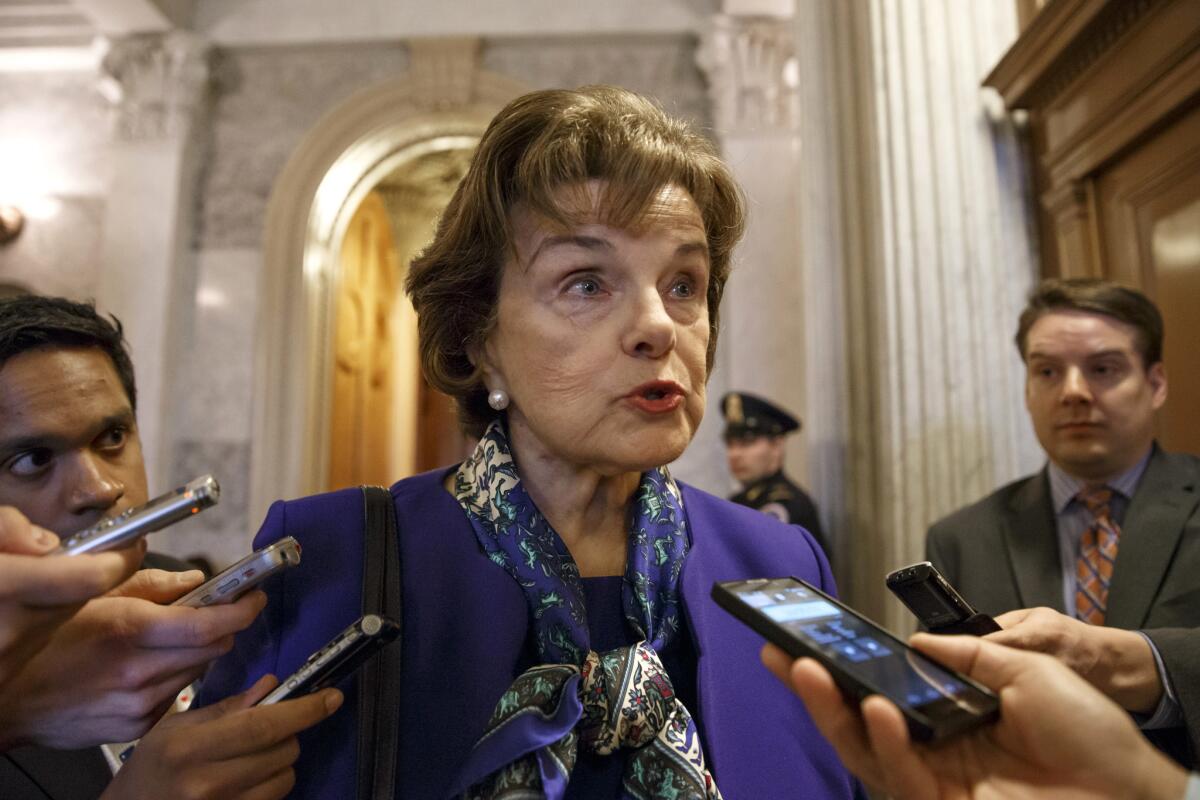Feinstein cleared by Justice Department in husband’s stock trades

- Share via
WASHINGTON — The Justice Department is dropping its inquiry into Sen. Dianne Feinstein over stock trades made as the novel coronavirus struck the U.S. and roiled the economy, a person familiar with the matter said.
Feinstein (D-Calif.) is among a handful of senators whose stock trades have been scrutinized by federal investigators to see if they violate a law preventing lawmakers from utilizing insider information gleaned from their work. She had denied wrongdoing and said the trades were made by her husband.
For the record:
2:42 p.m. May 27, 2020Sen. Jim Inhofe is a Republican representing Oklahoma.
A spokesman for Feinstein declined to comment.
Federal prosecutors informed Feinstein’s personal attorney Tuesday afternoon of their decision. The person familiar with the matter said prosecutors were also closing investigations into two other senators who traded stocks in the days before the market tanked: Sen. Kelly Loeffler (R-Ga.) and Sen. Jim Inhofe (R-Okla.). Loeffler sold stocks valued at $1.25 million to $3.1 million in late February and early March in companies whose value later dropped significantly. In January, Inhofe sold stocks worth as much as $750,000.
Loeffler’s office confirmed the senator had been notified the investigation has been dropped.
“Today’s clear exoneration by the Department of Justice affirms what Senator Loeffler has said all along— she did nothing wrong,” said a spokesperson, Stephen Lawson.
A representative of Inhofe did not immediately respond to a request for comment.
The Justice Department’s decision came a week after federal agents dramatically escalated an investigation into another senator’s trades before the stock market tanked in response to public health lockdowns that snarled the economy. Sen. Richard Burr (R-N.C.) stepped down on May 14 from his powerful position as chairman of the Senate Intelligence Committee the morning after the Los Angeles Times reported that the FBI had seized his cellphone as part of its investigation.
Burr sold a significant portion of his stock portfolio in 33 separate transactions on Feb. 13 just as his committee was receiving coronavirus briefings from U.S. public health officials and a week before the stock market declined sharply. Much of the stock was invested in businesses that in subsequent weeks were hit hard by the plunging market.
Congress in 2012 prohibited lawmakers from acting on information they learned in the course of their work, such as briefings with high-level federal officials.
The STOCK Act requires lawmakers to disclose their stock market activity but allows them to own stock, even in industries they might oversee.
The law passed the Senate in 2012 in a 96-3 vote. Burr was one of three “no” votes.
More to Read
Get the L.A. Times Politics newsletter
Deeply reported insights into legislation, politics and policy from Sacramento, Washington and beyond. In your inbox twice per week.
You may occasionally receive promotional content from the Los Angeles Times.












